Sunday Morning Stroll
I didn't have to leave for work today until 11am and so I thought I would take a morning stroll around the block. I heard that there were a couple of ATMs at the 'mall' behind our hotel and wanted to check that my Indian debit card was suitably depleted. 'The Mall' had no shops at all and consisted of a couple of half-built marble clad buildings with bank machines set into their bases, a guard at each. Across the road were some dwellings constructed from dry bricks and corrugated iron roofs.
People were washing in shallow woks of water and. cleaning their teeth. In the adjoining area of wasteland behind my luxury hotel, half a dozen people squat in the mud to do what they need to do.
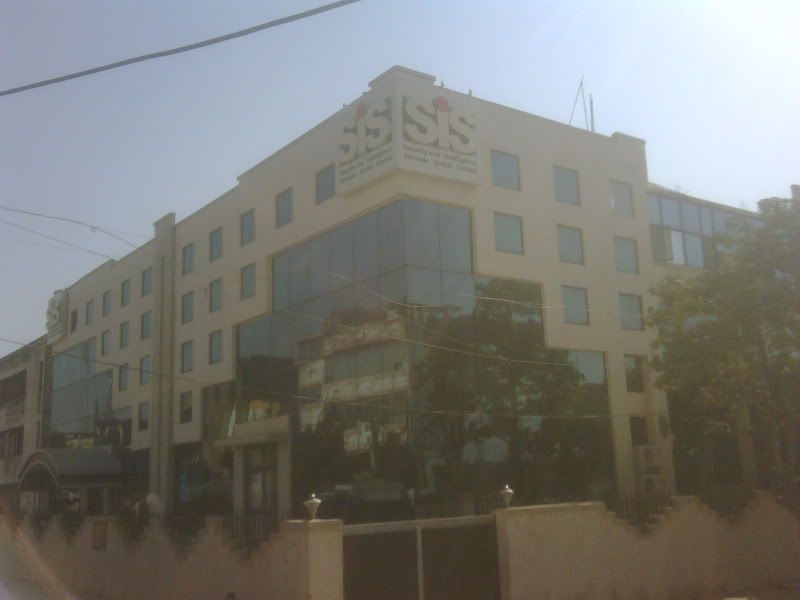
Adjacent to both is the headquarters for my company's namesake, SiS. Despite having an almost identical logo, in India it actually stands for Security and Intelligence Services.
Further down the road I found what must have been the public toilet. A dilapidated rusty wheel-less trailer, supporting a double row of cubicles. A pipe exiting from the bottom leading into a bubbling stinking swamp of effluent. It explains why people would rather just use the wasteland.
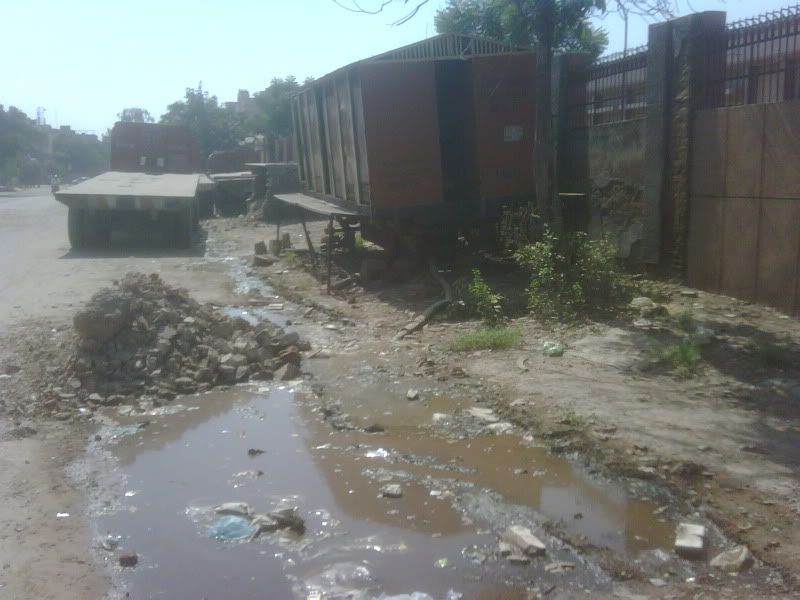
At the bottom of the street is a row of factories, all of which proudly bear signs that they do not employ child labour.
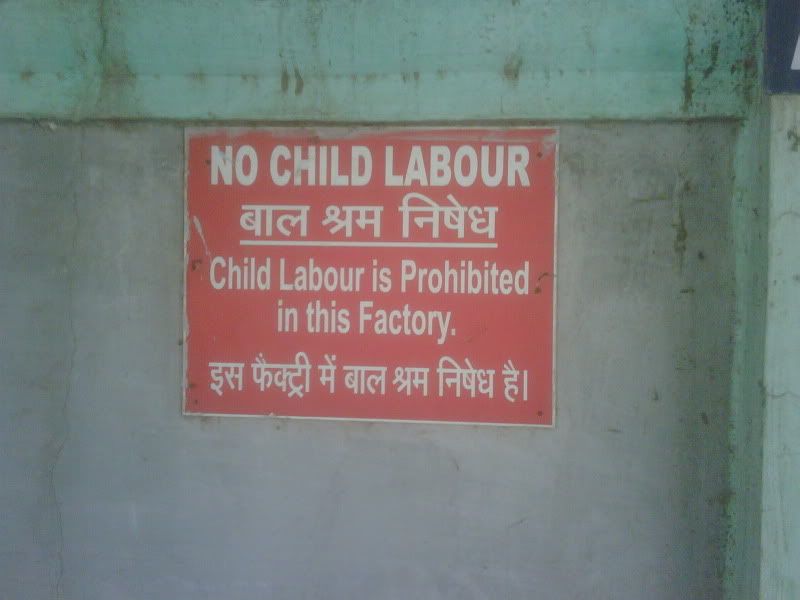
I decided to take a side street from here to try and rejoin the main road back to the hotel, rather than just retrace my steps. Behind the factories were rows and rows more brick and corrugated iron slums. I can only assume that these are for the benefit of the factory workers and their children.
Traditionally here people don't commute, you live right where you work, which I suppose would have made it easy for children to come into the factory with their parents.
A battered water tanker was parked in the road to supply these dwellings. Here too, people are washing themselves and their children in front of their dwellings. I realise that people are starting to pay attention to this stranger in their midst so I walk back down to the main drag with the factories.
Back on the factory road, a sacred cow lies in the street. Cars, bicycles and tuk-tuks swerving around it's disinterested bulk.
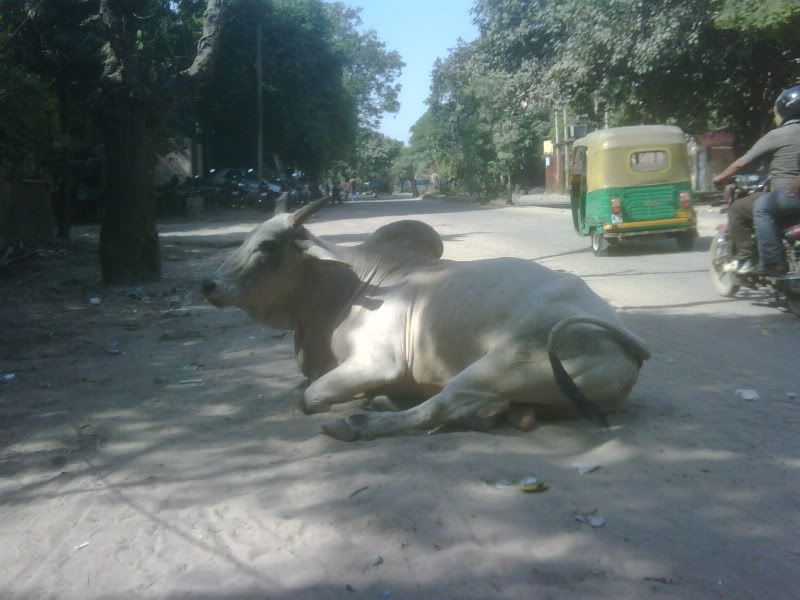
Children are playing cricket in the dusty street while people sell curry and paratha from little stalls. The air alternates with the aroma of spices and sewage.
Eventually I get back to the dual carriageway that leads back to my hotel, passing huge piles of rubbish, that this town just seems to exude from the pores of the ground. I see a thin middle aged woman taking a pick-axe to the tarmac, dressed in an inappropiately cheery pink sari. A stall holder is making ladders from long stalks of bamboo.
Further down the street a man in a welders mask is repairing something on the kerb side. Interspersed in all this, are families living in the most abject hovels.
I hear a chorus of horns and realise that three little girls are trying to wrestle a bag of what looks like grey rocks across the 2 lanes of road from the central reservation. They must have been no older than six years old and were struggling to move the load through the gap in the traffic. I looked on with alarm as two of the girls run to the pavement leaving the third alone struggling with the bag as the vehicles approach. I motion to help, but the traffic stops short of her and she tugs at the bag, which is almost as tall as herself. The other two girls rejoin her and drag the stones to the safety of the walkway. I feel really guilty for not assisting, but also feel that dramas like these must be acting out continuously here. It makes me feel somewhat detached from everything I see on the street.
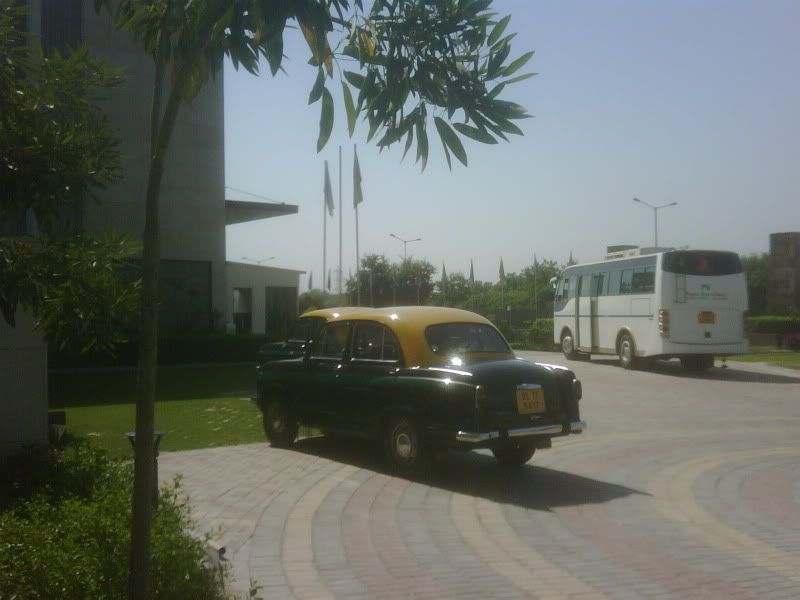
Soon, my hotel looms before me, by far the largest structure in the area. As I approach, security guards greet me and once again I am back in my safe and secure enclave.
Worlds apart.
People were washing in shallow woks of water and. cleaning their teeth. In the adjoining area of wasteland behind my luxury hotel, half a dozen people squat in the mud to do what they need to do.

Adjacent to both is the headquarters for my company's namesake, SiS. Despite having an almost identical logo, in India it actually stands for Security and Intelligence Services.
Further down the road I found what must have been the public toilet. A dilapidated rusty wheel-less trailer, supporting a double row of cubicles. A pipe exiting from the bottom leading into a bubbling stinking swamp of effluent. It explains why people would rather just use the wasteland.

At the bottom of the street is a row of factories, all of which proudly bear signs that they do not employ child labour.

I decided to take a side street from here to try and rejoin the main road back to the hotel, rather than just retrace my steps. Behind the factories were rows and rows more brick and corrugated iron slums. I can only assume that these are for the benefit of the factory workers and their children.
Traditionally here people don't commute, you live right where you work, which I suppose would have made it easy for children to come into the factory with their parents.
A battered water tanker was parked in the road to supply these dwellings. Here too, people are washing themselves and their children in front of their dwellings. I realise that people are starting to pay attention to this stranger in their midst so I walk back down to the main drag with the factories.
Back on the factory road, a sacred cow lies in the street. Cars, bicycles and tuk-tuks swerving around it's disinterested bulk.

Children are playing cricket in the dusty street while people sell curry and paratha from little stalls. The air alternates with the aroma of spices and sewage.
Eventually I get back to the dual carriageway that leads back to my hotel, passing huge piles of rubbish, that this town just seems to exude from the pores of the ground. I see a thin middle aged woman taking a pick-axe to the tarmac, dressed in an inappropiately cheery pink sari. A stall holder is making ladders from long stalks of bamboo.
Further down the street a man in a welders mask is repairing something on the kerb side. Interspersed in all this, are families living in the most abject hovels.
I hear a chorus of horns and realise that three little girls are trying to wrestle a bag of what looks like grey rocks across the 2 lanes of road from the central reservation. They must have been no older than six years old and were struggling to move the load through the gap in the traffic. I looked on with alarm as two of the girls run to the pavement leaving the third alone struggling with the bag as the vehicles approach. I motion to help, but the traffic stops short of her and she tugs at the bag, which is almost as tall as herself. The other two girls rejoin her and drag the stones to the safety of the walkway. I feel really guilty for not assisting, but also feel that dramas like these must be acting out continuously here. It makes me feel somewhat detached from everything I see on the street.

Soon, my hotel looms before me, by far the largest structure in the area. As I approach, security guards greet me and once again I am back in my safe and secure enclave.
Worlds apart.